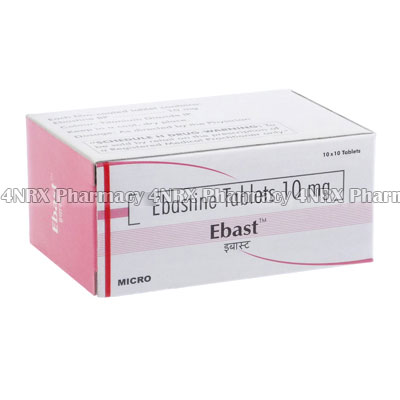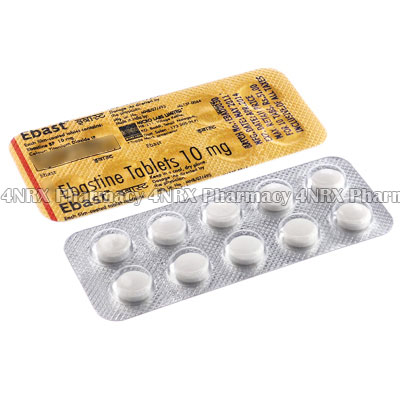 |
Home  Allergies Allergies  Ebast (Ebastine BP) Ebast (Ebastine BP) |
|
|||||||||
|
|
Ebast (Ebastine BP)
What is Ebast (Ebastine BP) used for? Ebast (Ebastine) is an antihistamine used to treat a wide variety of allergic reactions. It operates by blocking histamine receptors to narrow blood vessels reducing the occurrence of swelling, redness, or irritation. This makes it effective for alleviating a stuffy nose, sore throat, sneezing, or skin reactions such as hives. Your doctor may also prescribe it to treat other unlisted conditions. How should I use Ebast (Ebastine BP)? Ebast (Ebastine) is normally taken once each day at a dosage of one tablet, but your particular instructions will be determined by your doctor based on the condition being treated and the severity of your symptoms. These should be swallowed whole and unaltered along with a large glass of water. They may be taken on an empty stomach, although a meal or snack is recommended before use if you experience nausea. Do not change the form of the tablets before use to avoid destroying or altering the effects of their contents. What are the side effects of Ebast (Ebastine BP)? The use of Ebast (Ebastine BP) may cause side effects such as:
Serious side effects that may require immediate medical attention include irregular heartbeats, chest pain, trouble breathing, tremors, lower potassium levels, or unusual mood changes. These conditions may require reduced dosages or application frequency to prevent further health problems from occurring. Please Note Consult your doctor before beginning to use Ebast (Ebastine BP) to make sure you do not have any conditions that may cause severe health problems during treatment requiring special adjustments toy our regimen. Strictly use Ebast (Ebastine BP) as prescribed and follow all instructions provided by your doctor. Safe, suitable, and optimum dosage can vary and is dependent on the patient`s health and medical history, as well as the condition you are treating. Ebast (Ebastine BP) may not be safe or suitable for all patients. Always ensure your doctor is informed if you are pregnant or breastfeeding, using any other type of medication (including non-prescription medicine, vitamins, and supplements), as well as if you have any allergies, other illnesses, or pre-existing medication conditions. Seek immediate medical attention or proceed to your nearest accident and emergency department if you suffer a hypersensitive or allergic reaction. Symptoms usually present during a reaction of this nature include difficulty breathing or swallowing, swelling of the limbs or face, tight chest, hives, and skin rashes. 

|
||||||||||||||||||